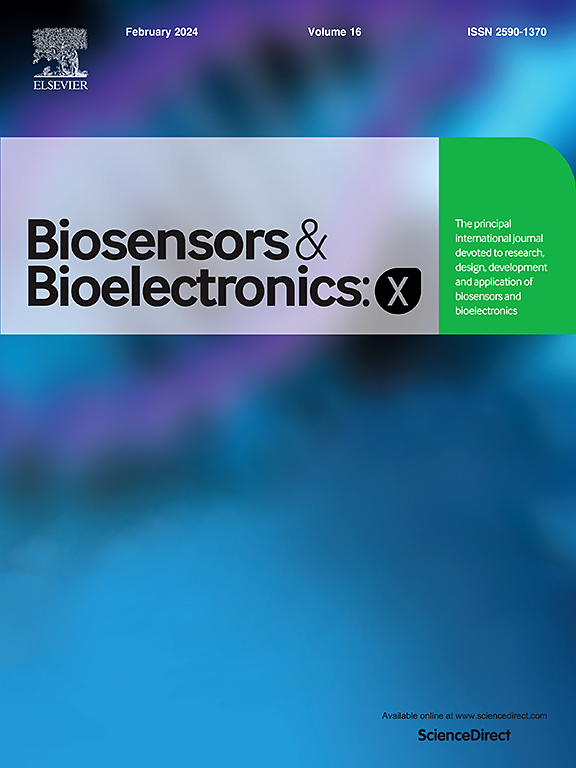用于检测免疫检查点相关蛋白的电化学传感器及其在癌症伴随诊断中的作用
IF 10.61
Q3 Biochemistry, Genetics and Molecular Biology
引用次数: 0
摘要
癌症伴随诊断在帮助确定患者是否将受益于免疫检查点抑制剂(ICI)治疗方面非常重要。确定治疗成功的机会有助于告知临床医生为特定患者做出最佳治疗决策。许多免疫检查点相关蛋白显示出作为ICI成功的生物标志物的潜力,如检查点蛋白本身、细胞因子、白细胞介素和其他免疫反应相关蛋白。研究最多的检查点抑制剂蛋白是程序性死亡配体1 (PD-L1),它被用作临床诊断测试的生物标志物,但有一些局限性。在不久的将来,对许多不同生物标志物的测试将开始商业化,同时对多种生物标志物进行测试,从而更好地预测潜在的ICI成功。电化学传感器是一种高灵敏度的护理点诊断技术,可以实现一次检测多种生物标志物的潜力。该领域面临的主要问题是提高其灵敏度,以便能够检测液体活检样本中发现的极低浓度的生物标志物。许多方法,如用高导电性材料增强电极表面或通过信号放大分子增加被测电化学信号的研究已经取得了很好的结果。本文综述了与预测ICI成功相关的潜在生物标志物,以及目前已开发的用于确定这些蛋白质表达水平的电化学传感器。本文章由计算机程序翻译,如有差异,请以英文原文为准。
Electrochemical sensors for the detection of immune checkpoint related proteins and their role in cancer companion diagnostics
Cancer companion diagnostics are incredibly important in helping to determine whether a patient will benefit from immune checkpoint inhibitor (ICI) treatment. Determining the chances of treatment success helps to inform clinicians to make the best treatment decisions for a particular patient. Many immune checkpoint related proteins show potential as biomarkers for ICI success, such as the checkpoint proteins themselves, cytokines, interleukins and other immune response related proteins. The most investigated checkpoint inhibitor protein is Programmed Death Ligand 1 (PD-L1), which is used as a biomarker in clinical diagnostic tests but, with some limitations. In the near future, tests for many different biomarkers will start becoming commercially available along with tests for multiple biomarkers simultaneously, giving an even better prediction of potential ICI success. Electrochemical sensors are a high sensitivity point of care diagnostic technique that can have the potential to achieve detection of multiple biomarkers at once. The main problem facing this field is improving their sensitivity to be able to detect the incredibly low concentrations of biomarkers found in liquid biopsy samples. Many methods such as enhancing an electrode surface with high conductivity materials or increasing the measured electrochemical signal via signal amplifying molecules have been investigated with promising results. This review investigates the potential biomarkers relevant to predicting ICI success, as well as the current electrochemical sensors that have been developed to determine the expression levels of these proteins.
求助全文
通过发布文献求助,成功后即可免费获取论文全文。
去求助
来源期刊

Biosensors and Bioelectronics: X
Biochemistry, Genetics and Molecular Biology-Biophysics
CiteScore
4.60
自引率
0.00%
发文量
166
审稿时长
54 days
期刊介绍:
Biosensors and Bioelectronics: X, an open-access companion journal of Biosensors and Bioelectronics, boasts a 2020 Impact Factor of 10.61 (Journal Citation Reports, Clarivate Analytics 2021). Offering authors the opportunity to share their innovative work freely and globally, Biosensors and Bioelectronics: X aims to be a timely and permanent source of information. The journal publishes original research papers, review articles, communications, editorial highlights, perspectives, opinions, and commentaries at the intersection of technological advancements and high-impact applications. Manuscripts submitted to Biosensors and Bioelectronics: X are assessed based on originality and innovation in technology development or applications, aligning with the journal's goal to cater to a broad audience interested in this dynamic field.
 求助内容:
求助内容: 应助结果提醒方式:
应助结果提醒方式:


